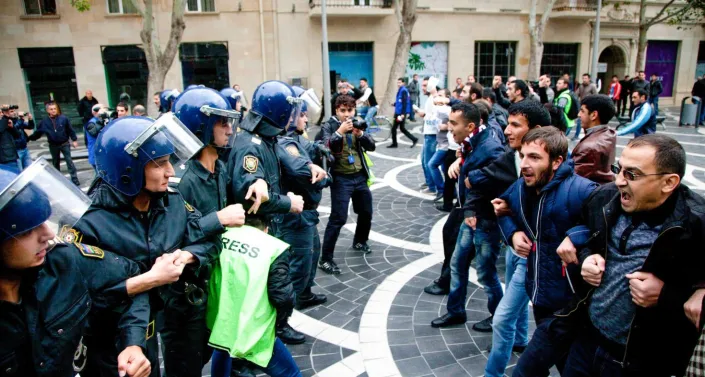
Azerbaijan
Azerbaijan ranks 154th out of 180 on the RSF Press Freedom Index, has 47 TV channels and several print publications, and 79% of the population connected to the internet. Although the media has formally abandoned the administrative system of Soviet times, media outlets act as if it were still in place.
There are no favourable conditions for the development of independent media in the country. Two state-funded TV channels, AZTV and ITV, represent the interests of the government that funds them, not of society. Even during presidential election campaigns, opposition candidates have limited access to broadcast media, state and private, because they are all controlled by the government. There are no longer provisions for free airtime for all candidates which would give an opportunity to criticise domestic and foreign policies, or any illegal actions taken by the government. The opposition has more opportunities to voice criticism on social networks and during rallies, than through mainstream media.
Restrictive media landscape
The situation in the print press is lamentable. Newspapers such as Azadliq, Ayna, and Zerkalo had hundreds of advertising partners in the mid-1990s and yet today they have all ceased to operate. The deterioration of the political situation over the past years is reflected in the advertising market, resulting in newspapers that stop publishing. Another challenge remains the identity of the media entrepreneurs, who are not known and as such, operate without transparency. Most outlets in Azerbaijan do not have long-term strategies because of the lack of competition and free market rules.
In 2013, a project approved by President Ilham Aliyev’s decree, started granting free housing to local journalists. The Government provided apartments for 156 journalists in 2013, 255 journalists in 2017 and another 255 in 2020. Accepting free housing is in breach of the Code of Professional Ethics of Journalists of Azerbaijan, but many print, radio, TV journalists accepted this gift, thus becoming spokespersons of the regime and remaining silent about human right abuses and high levels of corruption in society.
Safety
Freedom of expression in Azerbaijan is facing a major threat. The post-election crackdown, the Covid crisis and the war in Nagorno-Karabakh have all contributed to an increase in censorship and a worsening of the situation for journalists. In 2021, 11 journalists were detained and 2 murder cases of journalists took place where in both cases the killers are still at large. The European Court of Human Rights’ has stated to see a troubling pattern in how the country uses arbitrary arrests and detention of government critics, civil society activists, and human rights defenders as retaliatory prosecutions. For this the government misuses criminal law, which is in defiance of the rule of law. However, authoritarian ruler Ilham Aliyev has tightened his grip on power, using nationalist rhetoric to fuel the war in Nagorno-Karabakh and efficiently neutralize nationalist opposition parties.
Under current amendments to the Law on Information adopted by the parliament in response to the Covid-19 pandemic, owners of internet information resources face up to three years in prison if disclosing information that authorities deem false and could pose a threat to public health or safety. As long as journalists are unable to work safely, criticism is crushed and media economic independence is not assured, society will remain uninformed and doomed to be manipulated and disregarded by the unchecked power of an authoritarian leader.
Free Press Unlimited’s partners
As media outlets are unable to operate safely inside of the country, Free Press Unlimited’s main partner in Azerbaijan is a newsroom in exile. Run from abroad, online broadcaster Meydan TV covers a wide range of very sensitive topics such as the violation of human rights, the persecution of LGBT+ people, and gender-related topics. With the support of Free Press Unlimited, Meydan TV is experimenting with audience engagement via different formats of content production and dissemination in social media. Free Press Unlimited also supports a small media startup called Microscope that delivers content via social media. Safety is one of the most important aspects in cooperating with the media in Azerbaijan. Inside the country, journalists work secretly under permanent risks. Free Press Unlimited developed special security protocols to cooperate safely, on different levels.
Photo: Aziz Karimov
